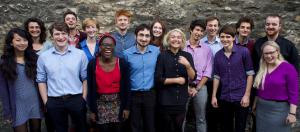
5,000 people have pledged to give 10% of their lifetime earnings to effective charities
5,000 people have pledged to give 10% of their lifetime earnings to charities which can most income to improving the lives of others
The organisation was founded following Oxford University philosopher Toby Ord’s decision to give more than half of all his future earnings to effective charities.
Since its founding in December 2009, Giving What We Can has attracted members from 87 countries. Its members come from a diverse range of backgrounds, ages, professions, incomes and philosophies – all united by a commitment to helping others. Together the members have donated at least $195 million and their pledges are estimated to amount to ~$1.8 billion.
Dr. Ord said: “I am delighted to reach this milestone, and that so many people have taken this pledge. And pledging is only half of the story — where you give your money is as important as making the decision to give in the first place.”
“Research shows that the best charities can have at least ten times the social impact of the typical charity, and hundreds of times as much as less effective charities. By finding outstanding giving opportunities we can make a significant difference to many more lives than we otherwise would.”
“We believe there is a strong moral case for people to give to the causes they deem to use money most efficiently.”
Their members donate to a vast range of highly effective charities. From the Against Malaria Foundation (which is estimated by charity evaluator GiveWell to save a life for every ~$2,500 donated); to the Good Food Institute (which works to create a humane, and sustainable food supply); or the Johns Hopkins Center For Health Security (which works to protect people’s health from the consequences of epidemics and disasters). The most popular option for members recently has been to pool their funds together in Effective Altruism Funds to find outstanding giving opportunities across different causes.
Dr. Ord has recently published The Precipice, a book that summarises his research into catastrophic risks that may pose the greatest threat to human life – and which interventions may be best-suited to address those risks. These risks include catastrophic pandemics, extreme climate change, high-fatality global conflicts, and unsafe artificial intelligence applications.
Recent research by Dr. Andreas Mogensen of Oxford’s Philosophy Faculty indicates that giving and so-called “sacrifice,” in the service of a more-just world, has a positive effect on our happiness. Research by Dr. Nicholas Epley at the University of Chicago’s Booth School of Business suggests that offering financial or material support to others generates more happiness for the giver, than would otherwise retaining money and material goods for oneself.
Giving What We Can, a community of people who have pledged to give a significant portion of their income to improving the lives of others, announced 5,000 individuals had made their pledge to give 10% of lifetime to effective charities.
The organisation was founded following Oxford University philosopher Toby Ord’s decision to give more than half of all his future earnings to effective charities.
Since its founding in December 2009, Giving What We Can has attracted members from 87 countries. Its members come from a diverse range of backgrounds, ages, professions, incomes and philosophies – all united by a commitment to helping others. Together the members have donated at least $195 million and their pledges are estimated to amount to ~$1.8 billion.
Dr. Ord said: “I am delighted to reach this milestone, and that so many people have taken this pledge. And pledging is only half of the story — where you give your money is as important as making the decision to give in the first place.”
“Research shows that the best charities can have at least ten times the social impact of the typical charity, and hundreds of times as much as less effective charities. By finding outstanding giving opportunities we can make a significant difference to many more lives than we otherwise would.”
“We believe there is a strong moral case for people to give to the causes they deem to use money most efficiently.”
Their members donate to a vast range of highly effective charities. From the Against Malaria Foundation (which is estimated by charity evaluator GiveWell to save a life for every ~$2,500 donated); to the Good Food Institute (which works to create a humane, and sustainable food supply); or the Johns Hopkins Center For Health Security (which works to protect people’s health from the consequences of epidemics and disasters). The most popular option for members recently has been to pool their funds together in Effective Altruism Funds to find outstanding giving opportunities across different causes.
Dr. Ord has recently published The Precipice, a book that summarises his research into catastrophic risks that may pose the greatest threat to human life – and which interventions may be best-suited to address those risks. These risks include catastrophic pandemics, extreme climate change, high-fatality global conflicts, and unsafe artificial intelligence applications.
Recent research by Dr. Andreas Mogensen of Oxford’s Philosophy Faculty indicates that giving and so-called “sacrifice,” in the service of a more-just world, has a positive effect on our happiness. Research by Dr. Nicholas Epley at the University of Chicago’s Booth School of Business suggests that offering financial or material support to others generates more happiness for the giver, than would otherwise retaining money and material goods for oneself.
For more information on Giving What We Can, visit: http://www.givingwhatwecan.org/ or contact media@givingwhatwecan.org.
Case studies of people who pledge to give
We have dozens of case studies from members who come from all walks of life and all over the world. You can read the case studies and quotes at http://www.givingwhatwecan.org/case-studies
If you would like to interview any of our members please email media@givingwhatwecan.org and let us know if there’s any particular profile you are interested in.
Quotes from early members about the milestone are available at https://www.givingwhatwecan.org/post/2020/09/5000-people-have-pledged/
Luke Freeman
Giving What We Can
+61 404 255 632
email us here
Visit us on social media:
Facebook
Twitter
LinkedIn
A Message To The 5,000 Members Who Pledged To Give 10% Of Their Lifetime Income To Effective Charities
Distribution channels: Banking, Finance & Investment Industry, Culture, Society & Lifestyle, Human Rights, International Organizations, World & Regional
Legal Disclaimer:
EIN Presswire provides this news content "as is" without warranty of any kind. We do not accept any responsibility or liability for the accuracy, content, images, videos, licenses, completeness, legality, or reliability of the information contained in this article. If you have any complaints or copyright issues related to this article, kindly contact the author above.
Submit your press release


